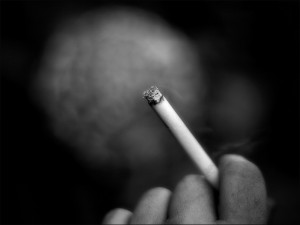The Centers for Disease Control has found increasing the price of cigarettes reduces demand. Teenagers are especially sensitive to price, so if the tax is approved, fewer of them would pick up the habit. Right now about 12 percent of Californians smoke. That rate could drop significantly if Prop 29 is approved.
There's also a financial bonus. The state’s Legislative Analyst Office estimates the measure will provide more than $700 million dollars annually in revenue.
Some of the money will go to anti-smoking programs and enforcing tobacco laws. But the bulk of it will fund medical research on cancer and other tobacco-related illnesses. Warner says that’s only fair.
"Those of us who don’t smoke in California, we’re paying the bill," Warner added. "We’re paying billions of dollars in health care costs because of smoking and it is preventable."
If fewer people smoke, tobacco companies will lose money, and they’re spending mightily to stop Proposition 29. Phillip Morris, R.J. Reynolds, and others have, so far, poured $40 million into defeating the June ballot measure, more than five times their opponents.
Tobacco companies, though, are keeping a low profile. An R.J. Reynolds spokesman referred media calls to a coalition of anti-tax groups which are the campaign’s public face. Tom Del Beccaro chairman of the California Republican Party, says Californians can’t afford a higher tax burden than they already have. "I’m fond of saying, If you can’t afford the mortgage, you shouldn’t be doing any additions to the house. This is an addition."
He says the funds dedicated to medical research would create a new state bureaucracy at a time when California can’t manage its current slate of programs.
"Any new government program," Del Beccaro says, "where you are taking money out of people’s pockets is only going to drag California down further. So quite apart from the specific issue, Californians can’t afford this."
Joe Mathews is a fellow at the New America Foundation and an expert on California's initiative process. "This is kind of the vanilla ice cream with chocolate on top that should pass by natural rights, but may not." The problem, he says, is the idea of having "gold-plated" programs while gutting core health programs is problematic for some voters.
"I think that’s an argument that may have some traction politically," Matthews adds. "It’s certainly an argument that has lot of merit policy wise."
Health groups say they’ve tried to raise the cigarette tax through the state legislature nearly three dozen times and have offered to put much of the money into the state’s general fund. Those efforts, the groups say, could never overcome Republican opposition to raising taxes, even one targeted at smokers.
The library at the University of California, San Francisco houses previously secret tobacco company documents made public as part of a historic industry settlement. There, professor of medicine and tobacco researcher Stan Glantz points to a series of state-sponsored anti-smoking ads that parody the well-known Marlboro Cowboy.
"One is a cowboy looking at his horse saying, 'Chemotherapy scares me Scout,'" he described. "Another one is two cowboys riding off into the sunset saying, 'I miss my lung Bob.'"
During the 1990s, billboards like these blanketed the state. Now Glantz says, the cigarette tax has remained the same since 1999 but the cost of advertising has gone up. So ads like the cancer-stricken cowboys are rare.
"When you're running a tobacco control program, especially a media campaign, if you have the world’s best ads and not enough money for people to see them, they don’t work."
With tens of millions of dollars going into the fight over the tobacco tax measure, it’s unlikely any California voter could avoid ads this election season.
Learn More
To see how California's cigarette rates compare to other states, visit KQED's The Lowdown. The blog has non-partisan links to voter information, too.
